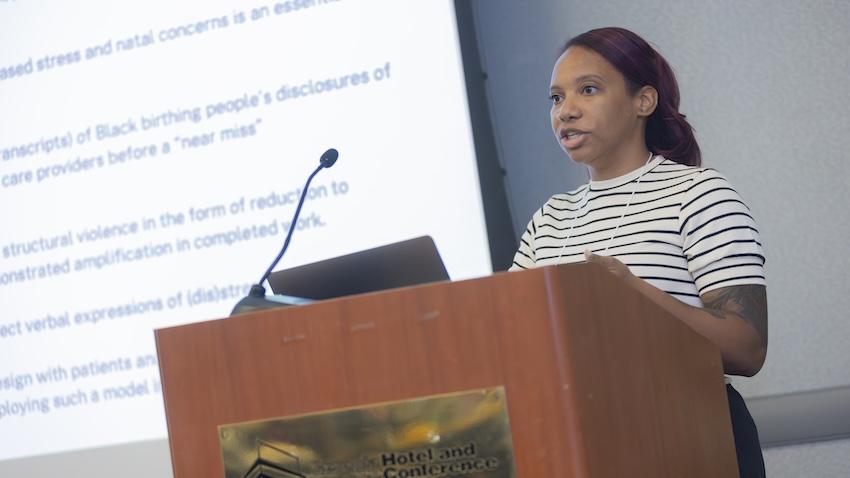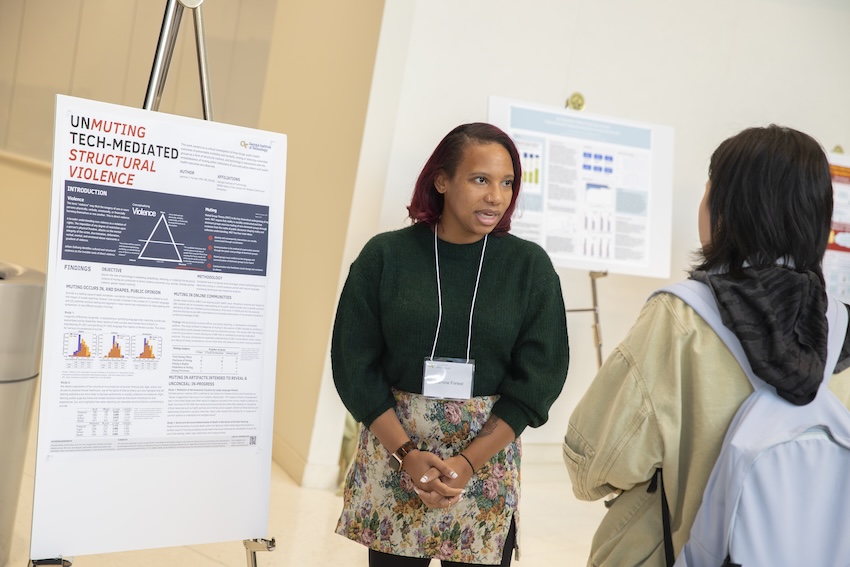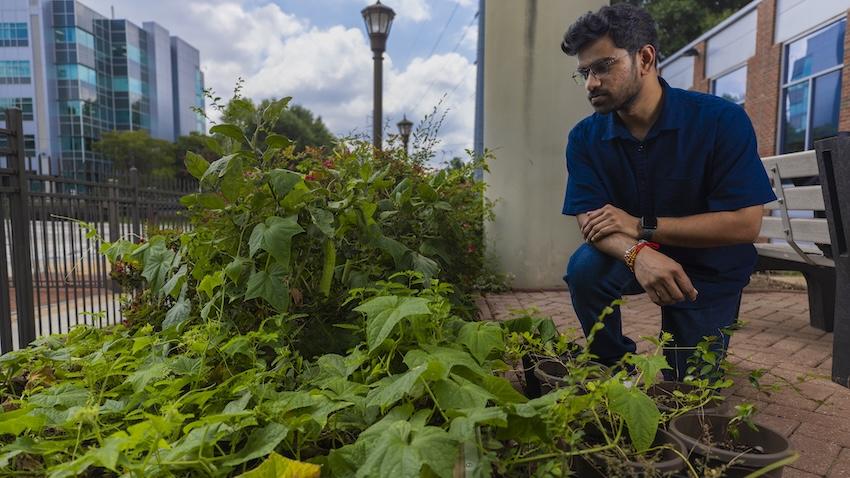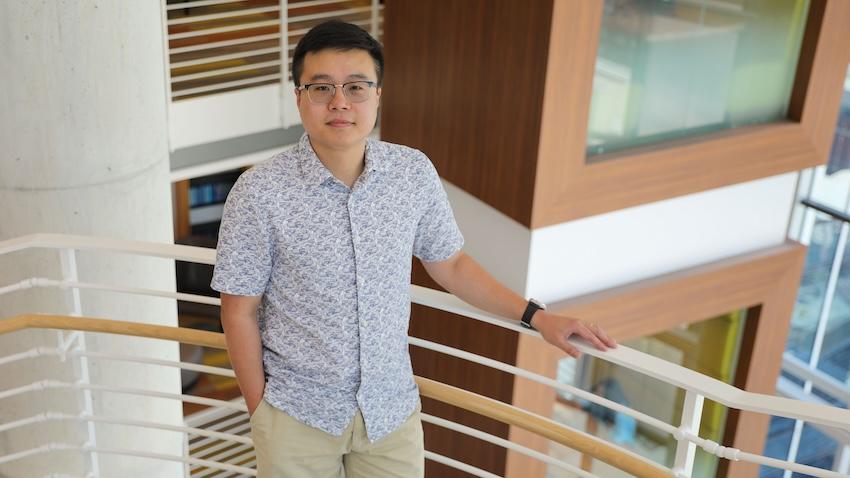
Ph.D. Student Fills Violence Data Gaps Through Technology
After Jasmine Foriest was robbed at gunpoint in her hometown of Columbus, Ga., she took note of how much information about the crime fell through the cracks of the ensuing police investigation.
She said the police officer who interviewed her was dismissive and neglected to write down details that Foriest found significant. The deficient police report was picked up by local media, which led to news stories that inaccurately described the crime and left out important information.
Foriest said she learned from the incident that incomplete information doesn’t mitigate violence. The perspectives and stories of people who experience violence are essential to reliable data.
The incident guided Foriest as she committed to research that gathers complete and accurate data on multiple types of violence, including violent injury and homicide, intimate partner violence, gender-based violence, and suicide.
Foriest earned a bachelor’s in health science from Columbus State University. She also holds two master’s degrees: one in public health from the University of Southern California, and another in technology leadership and management from Agnes Scott College.
In 2021, Foriest started her Ph.D. in human-centered computing at Georgia Tech to understand how technology influences violence.
“I look at all types of violence as an outcome of how technology affects communication,” she said.
One thing she discovered was that even though technology can amplify victims’ voices, it is often used to silence them.
“The same social dynamics that keep people from disclosing their violent experiences to formal reporting sources offline also happen online,” she said.
Bringing the Cardiff Model to the U.S.
Before arriving at Tech, Foriest worked for eight years as an injury prevention coordinator at Grady Memorial Hospital in Atlanta. She implemented a trauma recovery center and Atlanta’s first hospital-based violence intervention program.
While in that position, she worked with the Cardiff Model for Violence Prevention, a public health approach to violence prevention developed by researchers at Cardiff University in Wales.
The Cardiff model’s philosophy is that violence prevention is best achieved when the healthcare and law enforcement sectors combine geographical data to determine where violence occurs in a community.
“The Cardiff model taught Wales there was a lot about violence they didn’t know from police data alone,” Foriest said.
One example is that researchers learned an alarming number of hospital patients were brought in from local taverns. This finding informed policymakers to implement new regulations, such as changing licensing requirements and serving alcohol in toughened glasses or non-glass vessels so they can’t be used as weapons.

In 2011, the city of Cardiff reported a 42% reduction in hospital admissions for hospital injuries. It wasn’t long before the researchers in the U.S. began importing the Cardiff model. In 2018, it became an official policy of the Centers for Disease Control and Prevention (CDC).
The U.S. Department of Justice found in 2022 that 58% of violent crimes were not reported to law enforcement. Sixteen cities that make up the Cardiff Model for Violence Prevention National Network are now gathering and mapping patient-reported violent injury data from hospitals to fill that data gap.
Atlanta is one of the cities in that network, and Foriest has been an on-the-ground researcher collecting that data. Her work with the Cardiff model seamlessly integrated into her Ph.D. research as she sought ways to turn technology into a safe avenue of violence disclosure.
Working with Alex Godwin, a former Ph.D. student at Georgia Tech who is now an assistant professor at American University, she helped develop a user interface and mapping algorithm. The tool allows hospital patients who are violence victims to identify the location of the violent incident they experienced.
Foriest said, “Around the Covid-19 pandemic, we had challenges getting patients screened, and we thought we should explore different options.
“Our interface allows patients to tap down to the degree they’re comfortable on the geographic location where they were injured.
“It improved our ability to map data tremendously and decreased some of the risks patients face when disclosing violence.”
Foriest and Godwin's paper on the development of the interface tool earned an honorable mention for best paper at the 2025 Conference on Human Factors in Computing Systems (CHI) in Yokohama, Japan.
Foriest also co-authored an award-winning paper at the 2024 Conference on Computer-Supported Cooperative Work (CSCW). That paper examined how social media often silences violence victims.
Foriest is also a fellow for Data Science and Innovation at the CDC, where she continues her work on the Cardiff model. She also examines how news media coverage of suicides can often reinforce stigmas about the causes of suicide in that role.
Thriving at Tech
Foriest is entering her fifth year as a Ph.D. student, but before she came to Tech, she had no computing experience. She applied to numerous Ph.D. programs but was eventually persuaded that technology could complement her public health expertise and her goal of preventing violence.
“Tech was the only place where I could gain a new skill set while doing the things that I wanted to do in research,” she said.
“That felt like the best fit for me, where I would get the most out of my training. I was encouraged by faculty and my peers to recognize that my perspective is valuable, and I can speak from that place and bridge my knowledge with HCI concepts.”


